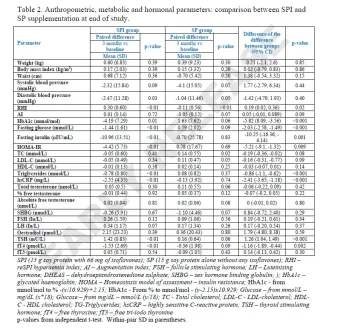Nelson Vergel
Founder, ExcelMale.com

Effect of Soy in Men With Type 2 Diabetes Mellitus and Subclinical Hypogonadism - A Randomized Controlled Study.
Sathyapalan T, et al. J Clin Endocrinol Metab. 2016.
Abstract
CONTEXT: Isoflavones found in soy products have a chemical structure similar to estrogen, leading to concerns of an adverse estrogenic effect in men, particularly in those with type 2 diabetes mellitus (T2DM) who have low testosterone levels due to hypogonadism.
OBJECTIVE: The primary outcome was change in total testosterone levels. The secondary outcomes were the changes in glycaemia and cardiovascular risk markers.
DESIGN: Randomised double blind parallel study.
SETTING: Secondary care setting in UK.
PARTICIPANTS: 200 men with T2DM with a total testosterone level≤12nmol/L Intervention: 15g soy protein with 66mg of isoflavones (SPI) or 15g soy protein alone without isoflavones (SP) daily as snack bars for three months.
RESULTS: There was no change in either total testosterone or in absolute free testosterone levels with either SPI or SP. There was an increase in TSH and reduction in fT4 (p<0.01) after SPI supplementation. Glycaemic control improved with a significant reduction in HbA1c (-4.19(7.29)mmol/mol,p<0.01) and HOMA-IR after SPI. Cardiovascular risk improved with a reduction in triglycerides, CRP and diastolic BP (p<0.05) with SPI versus SP supplementation. There was 6% improvement in 10-year coronary heart disease risk after three months of SPI supplementation. Endothelial function improved with both SPI and SP supplementation (p<0.01) with an increased reactive hyperemia index that was greater for the SPI group (p<0.05).
CONCLUSIONS: Testosterone levels were unchanged and there was a significant improvement in glycaemia and cardiovascular risk markers with SPI compared to SP alone over three months. There was significant increase in TSH and a reduction in fT4.
From study:
"There was a significant increase in TSH and reduction in fT4 with three months of combined SPI supplementation. Soy consumption is associated with thyroid disorders such as hypothyroidism, goitre, and autoimmune thyroid disease (46). In vitro studies have demonstrated that isoflavones inhibit thyroid peroxidase (TPO), an enzyme involved in the synthesis of T3 and T4 (47). In a study examining the effects of soy isoflavones, Fischer rat thyroid cells (FRTL) were treated with a combination of SPI; it was found that there was a dose dependent suppression of iodide uptake in FRTL cells whereas isoflavone alone was ineffective. SPI combination and isoflavone (genisten) alone increased the 40 kDa thyroglobulin fragment (P40, a known autoimmunogen) and non-glycosylated sodium/iodide symporter (NIS) in the FRTL cells that might contribute to the higher incidence of thyroid dysfunction (48). In patients with subclinical hypothyroidism, SPI combination has shown to increase the risk of developing overt hypothyroidism (49). In women during their early menopause SPI supplementation has shown to significantly increase TSH and reduce free thyroxine suggesting a detrimental effect on thyroid function (50). In the current study, none of the patients developed subclinical or overt hypothyroidism, however, all patients had normal thyroid function tests at baseline."











